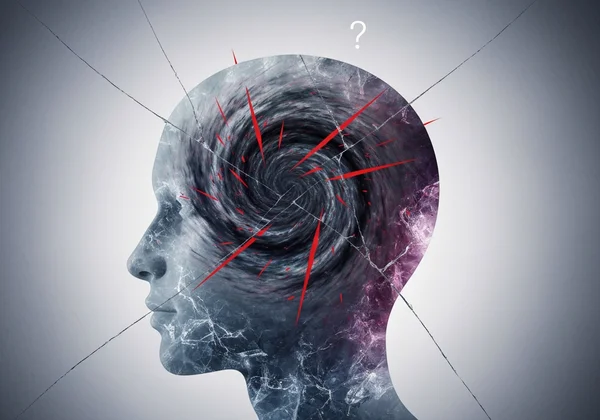SCL-90 Psychology Test: Understanding Paranoid Ideation, Suspicion & Trust
November 20, 2025 | By Marvin Martinez
Ever feel like you're walking on eggshells, constantly questioning the motives of others? Do you find yourself reading between the lines, searching for hidden meanings in casual conversations? These feelings of mistrust and suspicion, while common, can be confusing. The SCL-90's Paranoid Ideation scale, a key component of a broader psychology test, offers a valuable lens to explore these thought patterns. If you've ever found yourself searching for answers with questions like, what psychological disorder do I have test?, or considered taking an online psychology test free of charge, this guide is for you. It's not about labels, but about understanding what a comprehensive mental health test can reveal.
This article will help you decode the Paranoid Ideation dimension of the SCL-90. We'll explore what it means, what a higher score might indicate, and how you can use these insights for personal growth. Your journey toward self-awareness can start today; you can begin your self-discovery by taking our free, confidential assessment.
What is Paranoid Ideation in Psychology?
In the context of psychology and assessments like the SCL-90, "paranoid ideation" refers to thought patterns characterized by feelings of suspicion, mistrust, and the belief that others may be trying to harm, deceive, or take advantage of you. It’s important to see this as a spectrum. On one end, you have mild, fleeting thoughts, and on the other, more persistent and distressing feelings.
These thoughts can manifest as projection (attributing your own unacceptable feelings to others), hostility, and a general sense of being persecuted. This particular psychology test, the SCL-90, helps quantify these feelings, providing a snapshot of where you currently stand. It’s a starting point for gentle reflection, a chance to hold a mirror up to your internal world and simply observe what's there with curiosity and self-compassion.

Differentiating Ideation from Clinical Paranoia
It is absolutely crucial to understand the difference between paranoid ideation as measured in a self-report checklist and a clinical diagnosis of paranoia. The SCL-90 identifies thought patterns and emotional tendencies, not disorders. A higher score points to a tendency to think in a suspicious way, but it is not a diagnosis.
Clinical paranoia is a severe and persistent condition, often a symptom of serious mental health disorders like paranoid personality disorder or schizophrenia. It involves fixed, delusional beliefs that are not based in reality and significantly impair a person's ability to function. A diagnosis can only be made by a qualified mental health professional after a comprehensive evaluation. Think of the SCL-90 score as a weather report for your mind, not the final word on the climate. It gives you valuable information to work with and a chance to explore your results further.
Common Signs: Recognizing Mistrust and Suspicion
So, what does paranoid ideation look like in daily life? It can be subtle or overt, but it often involves a consistent lens of doubt through which you view the world. Recognizing these signs is the first step toward understanding them.
Here are some common manifestations:
- Hypervigilance: Constantly being on alert, scanning your environment and interactions for threats or signs of betrayal.
- Questioning Loyalty: Doubting the faithfulness and trustworthiness of friends, family, or partners without sufficient reason.
- Reluctance to Confide: Fearing that personal information will be used against you, making it difficult to be vulnerable with others.
- Finding Hidden Meanings: Perceiving demeaning or threatening messages in innocent remarks or events.
- Bearing Grudges: Holding onto insults or perceived slights for a long time and being unforgiving.
- Feeling Exploited: A persistent belief that others are using you or have malicious intentions, even without clear evidence.
If some of these resonate with you, it's simply an indication of a thought pattern worth exploring. The goal of a reliable assessment is to bring these patterns to light so you can approach them with curiosity.

Interpreting Your SCL-90 Psychology Test Score for Paranoid Ideation
Receiving your SCL-90 results is the next step in your journey. Remember, a score is just a number—a piece of data. It doesn't define you. Its true power lies in how you interpret it and use it as a catalyst for growth. The report you get from our AI-powered analysis can provide personalized insights that go beyond a simple number.
If you find your score on the Paranoid Ideation scale is higher, it simply indicates that in the past week, you've experienced a greater frequency of thoughts and feelings related to mistrust and suspicion. Crucially, this is not a judgment of your character, but rather a valuable piece of information for self-understanding. Instead, it’s an invitation to look deeper at the potential reasons behind these feelings and how they might be affecting your life and relationships. It’s an opportunity to understand your score in a supportive context.
What a Higher Score Might Indicate for You
A higher score can be influenced by many factors and may point toward several underlying experiences. It’s not about finding something "wrong" but about cultivating self-awareness.
For some, it might indicate:
- High Levels of Stress: When we're under immense pressure, our threat-detection system can go into overdrive, making us more suspicious.
- Past Betrayals or Trauma: Difficult past experiences can teach us to be wary of others as a protective mechanism.
- Social Anxiety: A deep-seated fear of judgment or rejection can lead to interpreting ambiguous social cues negatively.
- Low Self-Esteem: If we don't trust ourselves, it can be incredibly difficult to place our trust in others.
- Feelings of Isolation: Loneliness can sometimes foster a sense of being an outsider, which may breed suspicion about the intentions of the "in-group."
Seeing your score is a chance to connect the dots between your feelings and your life experiences.

Exploring Potential Factors & Triggers
Once you have your results from the psychology test, take a moment for gentle reflection. What are the potential triggers for these feelings of mistrust? Do they appear more frequently at work, in your romantic relationships, or with new acquaintances? Understanding the context is key.
Consider journaling about situations where you felt particularly suspicious or on guard. What was happening at that moment? Who was involved? What thoughts were running through your mind? This practice of mindful observation can help you detach from the thoughts and see them as mental events rather than absolute truths. This is the core of how you can use a psychology test online as a tool for meaningful change.
Beyond the Score: When to Seek Professional Support
A self-assessment tool like the SCL-90 psychology test is a fantastic starting point, but it has its limits. Its primary purpose is to foster self-exploration and provide information. If your feelings of mistrust are causing significant distress, damaging your relationships, or making it hard to go about your day, it may be time to consider professional support.
This is not a sign of failure but a courageous step toward well-being. A therapist can provide a safe, non-judgmental space to explore the roots of these feelings and develop effective coping strategies. They can help you build trust, both in yourself and in others, and navigate the complexities of your inner world.

Taking Action: Turning Insight into Growth
Knowledge becomes wisdom when you apply it. Your psychology test results are knowledge; what you do next is what creates personal growth.
Here are a few gentle strategies to consider:
- Challenge Your Assumptions: When a suspicious thought arises, pause and ask: "What is the evidence for this thought? Is there a more generous or neutral interpretation of this situation?"
- Practice Mindfulness: Mindfulness can help you observe your thoughts without getting entangled in them. You can learn to see a suspicious thought arise, acknowledge it, and let it go.
- Focus on Building Trust Incrementally: Start small. Choose one person you feel relatively safe with and practice sharing something slightly more personal. Notice how it feels.
- Improve Communication: Sometimes, mistrust stems from misunderstanding. Practice expressing your feelings and needs clearly and calmly using "I" statements.
Valuable Resources for Mental Well-being
Your journey to better mental well-being is unique to you. The insights from the SCL-90 can illuminate the path. Remember that seeking help is a sign of strength. Talking to a licensed therapist, counselor, or psychologist can provide you with personalized tools and support that go far beyond what any article or online psychology test can offer. They are trained professionals dedicated to helping you thrive. Ready to see what insights await? Try our free tool today.
Your Journey of Self-Understanding Continues
Understanding the Paranoid Ideation scale of the SCL-90 is about more than just a score; it's about gaining deeper insight into your own mind. These thought patterns are not your identity. They are simply habits of the mind that can be understood, addressed, and reshaped with curiosity and compassion.
Your self-discovery is a vibrant, continuous journey of learning and growth. Consider tools like our SCL-90 psychology test your trusted companions, providing objective insights to illuminate your introspection. Embrace the knowledge you've gained, be gentle with yourself through this process, and know that every step you take to understand your inner world contributes to a richer, more fulfilling life. Ready to take the next step? Start your journey on our homepage.
Frequently Asked Questions About Paranoid Ideation & SCL-90
What is the SCL-90 psychology test used for?
The Symptom Checklist-90 (SCL-90) is a widely used psychology test in the form of a self-report questionnaire designed to evaluate a broad range of psychological problems and symptoms of psychopathology. It serves as an excellent screening tool, providing insights across nine different dimensions of psychological distress, including paranoid ideation, depression, and anxiety. It helps individuals gain self-awareness about their current emotional state.
Does a high Paranoid Ideation score mean I have a psychological disorder?
No, absolutely not. A high score from any online psychology test is not a diagnosis. It simply indicates that you have recently experienced a higher frequency of thoughts and feelings related to mistrust and suspicion. Many factors, such as stress or past experiences, can influence this. A formal diagnosis can only be made by a qualified mental health professional after a thorough, in-person evaluation.
How reliable are online psychology tests like the SCL-90?
The SCL-90 itself is a scientifically validated and reliable instrument. When you take the psychology test on a platform like ours, you are using a tool rooted in decades of psychological research. Our version adds an AI-powered analysis to provide deeper, personalized insights. However, it's crucial to remember that it is intended for informational and educational purposes only and is not a substitute for professional clinical assessment.
When should I consider speaking with a mental health professional?
You should consider speaking with a mental health professional if your feelings of suspicion and mistrust are causing you significant emotional distress, negatively impacting your relationships, interfering with your work or daily life, or if you simply feel you need support. A professional can help you explore these feelings in a safe and constructive environment and develop healthy coping mechanisms.